"It is no exaggeration to say that democratic society is founded on a kind of faith: on the conviction that each citizen is capable of, and assumes, complete political responsibility. Each one not only broadly understands the problems of government but is willing and ready to take part in their solution. In a word, democracy assumes that the citizen knows what is going on, understands the difficulties of the situation, and has worked out for himself an answer that will help him to contribute, intelligently and constructively, to the common work (or "liturgy") of running his society.
"For this to be true, there must be a considerable amount of solid educational preparation. A real training of the mind. A genuine formation in those intellectual and spiritual disciplines without which freedom is impossible.
"There must be a completely free exchange of ideas. Minority opinions, even opinions which may appear to be dangerous, must be given a hearing, clearly understood and seriously evaluated on their own merits, not merely suppressed. Religious beliefs and disciplines must be respected. The rights of the individual conscience must be protected against every kind of open or occult encroachment.
"Democracy cannot exist when men prefer ideas and opinions that are fabricated for them. The actions and statements of the citizen must not be mere automatic "reactions"-mere mechanical salutes, gesticulations signifying passive conformity with the dictates of those in power.
"To be truthful, we will have to admit that one cannot expect this to be realized in all the citizens of a democracy. But if it is not realized in a significant proportion of them, democracy ceases to be an objective fact and becomes nothing but an emotionally loaded word.
"What is the situation in the United States today?"
Conjectures of a Guilty Bystander by Thomas Merton,
New York: Doubleday & Co, Inc., 1968 edition, p. 100-10
Tuesday, October 31, 2006
Monday, October 30, 2006
kenya 11b: 29 may (last one)
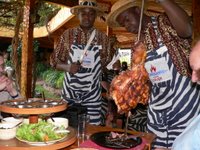
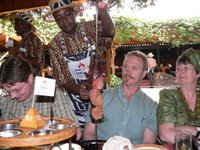

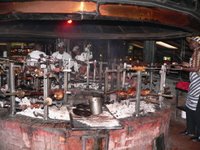
after leaving the park, we went for lunch at the world famous carnivore restauarant. as its name suggests, its a place to eat meat - tons of it! they expect you to eat as much as you can, and when you 'surrender', you lower the white flag on the table so the waiters know not to bring any more.
i had the following for lunch: onion soup and bread roll, spare pork ribs, pork, chicken wings, lamb, beef, camel, ostrich, crocodile, fresh fruit salad and ice cream, coffee. i was one of the final 3 to surrender, and while full, was not bloated!
the crocodile was a white meat that tasted liek a cross between some kind of deep-sea big fish, and chicken. the texture was like chicken breast, but with the flavour ebing more fishy - very nice. my vote for favourite though, was ostrich which was a fragrant meat - difficult to describe. it was a great experience to go this fantastic restaurant, and i highly recommend it.
we headed back to the city, where we visited the catholic bookshop again to do a bit more shopping. i bought a red stole, a cross for zoe, a banana leaf and skin picture, and a couple of books. some of us dropped our shopping and bags back to the bus for justus to take back to the guest house, while we went to the nairobi java house to relax with some good coffee. i also bought some kenya aa beans there before we walked back to the guest house before dark. nairobi is not a place to be out walking once darkness falls. but it was good to stretch the legs and do some exercise after such a big lunch.
had a bowl of soup for dinner, with a small piece of cake and a cuppa before we headed out to the airport. it was sad to say farewell to justus, gilbert, and jim - such good guys and wonderful guides who had been so conscientious in their care of us during the trip.
there's nothing much to do at nairobi airport, and so we contented ourselves with people-watching for a couple of hours until we boarded the plane and took off at 0010hrs.
the flight was uneventful, as was the drive home. i got home at 1020hrs, and it was great to be home again. thank you jesus for such a wonderful experience!
Friday, October 27, 2006
i count

this is something to DO!
this is something you CAN actually do!
this is something that is actually WORTH getting involved in!
this is something where you can join others and see that your care and efforts are NOT INCONSEQUENTIAL.
this is about YOU being involved and making a statement to yourself, your family, your friends, your neighbours, your country, and yes, even the world, and even yes, to GOD, that you are wanting to be counted amongst those who will STOP CLIMATE CHAOS.
so, let me encourage you to:
1. GO to trafalgar square on 4 november and make your presence felt;
2. visit the i count website, register, read, and DO the simple actions;
3. TELL other people about it.
go on. go on. go on. go on. go on. go on. go on.......
how to keep the lights on?

great picture of the earth at night, eh. look at all those lights on. not sure exactly how this picture is constructed, given the different time zones and hemispheres....
but where does the power come from? well, various national grids and then down the power lines to our homes and offices and factories and farms and....just flick a switch and, magic, the darkness is gone!
its not been like this for most of the world's history. in fact, its just a blink in time from the beginning of humanity, let alone the world itself.
so, how much longer will it be like this? where will the power keep coming from? who will generate the extra as more developing countries come on stream, and how will it be generated? simple questions, granted, but very real nonetheless. those questions include macro issues like international treaties on energy security, and micro issues like personal home power production.
george monbiot has some interesting thoughts on the latter here. he thinks small is useless, and he may well be right in this instance. but i'm not sure that its a good, helpful, and right mantra to say that 'small is useless'. and i dare say that george is not saying that small is useless in an overall kind of way.
but give people an option to say that its all too hard and that its got nothing to do with them and i'm only one person so what can i do and its all the government's responsibility anyway and i'm just going to leave the lights on coz i can, and they will.
i do think this is an area where government can set a standard and say something like, 'by 2010 there will be no more manufacturing of ordinary, energy inefficient lightbulbs'. it can't be that difficult actually. but it does require a will to act. as bono as often said, we can't do everything, but the things we can we must.
there'll be a way to keep the lights on, and a small way can begin with a small individual acting out of a strong will to proactively do the things they can. have a look at the ban the bulb website that gives lots of info and plenty of links for more info including where to buy energy efficient lightbulbs. not to mention the generous website where you can join with others in making a measurable, sustainable, and cybercultural difference to god's good earth.
Thursday, October 26, 2006
and who is my neighbour? (part 2)
The stories I gave in the last post are simple examples of our church communities trying to discover natural ways of demonstrating expressions of Kingdom principles. The focus is around promoting a practical commitment to neighbourliness, which is rooted in the sake of a commitment to neighbourliness itself – rather than neighbourliness as an aperitif for a main course of more self-conscious (and often up-tight) evangelism. This is justice and hospitality etc. for justice and hospitality’s etc. sake. In the process of doing neighbourliness, principles of building God’s Kingdom here on earth (now) are employed. These principles subvert a more traditional and obvious approach to mission. It’s about developing models of mission for people who don’t do mission, church for people who don’t go to church.
When Jesus was asked by a smart-alec lawyer, “And who is my neighbour?” (Luke 10:29), he was really asking, “Where, within the boundaries of those with whom I naturally have something to do, does my responsibility end?” So, he was actually trying to get a theoretical and technical definition that would absolve him from having to do anything with people who fell outside of the definition of ‘neighbour’. But Jesus was ruthless with him by telling the parable of the Samaritan (note that nowhere in the text is the Samaritan referred to as ‘good’). And a Jewish lawyer hated nobody with as much venom as he hated a Samaritan. At the end of Jesus’ parable, in verse 36, he asks the lawyer, “Which….do you think was a neighbour…?” The lawyer must concede that the neighbour was the Samaritan because of what he did. Jesus challenges the lawyer to, “Go and do likewise”. In other words, be like the Samaritan, a doer of God’s word, not just a theoretician about God’s word.
So, who is my neighbour? Neighbours are doers of God’s word. They should of course, include those of us who say that we are followers of Jesus, committed to living fully alive, shalom-like ways that bring resonances of heaven here on earth. But they can also include the most unlikely ones who, by their concrete actions in everyday life, demonstrate the principles of the Kingdom of God. Let me encourage you to be a good neighbour for the sake of our community – a community that God loves.
When Jesus was asked by a smart-alec lawyer, “And who is my neighbour?” (Luke 10:29), he was really asking, “Where, within the boundaries of those with whom I naturally have something to do, does my responsibility end?” So, he was actually trying to get a theoretical and technical definition that would absolve him from having to do anything with people who fell outside of the definition of ‘neighbour’. But Jesus was ruthless with him by telling the parable of the Samaritan (note that nowhere in the text is the Samaritan referred to as ‘good’). And a Jewish lawyer hated nobody with as much venom as he hated a Samaritan. At the end of Jesus’ parable, in verse 36, he asks the lawyer, “Which….do you think was a neighbour…?” The lawyer must concede that the neighbour was the Samaritan because of what he did. Jesus challenges the lawyer to, “Go and do likewise”. In other words, be like the Samaritan, a doer of God’s word, not just a theoretician about God’s word.
So, who is my neighbour? Neighbours are doers of God’s word. They should of course, include those of us who say that we are followers of Jesus, committed to living fully alive, shalom-like ways that bring resonances of heaven here on earth. But they can also include the most unlikely ones who, by their concrete actions in everyday life, demonstrate the principles of the Kingdom of God. Let me encourage you to be a good neighbour for the sake of our community – a community that God loves.
Wednesday, October 25, 2006
astonishment at the importance of religion?

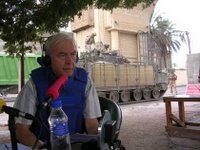
at the end of the today programme this morning is a 5 mins interview where john humphreys, currently in iraq, speaks with canon andrew white, the anglican vicar of basra who is also working with the iraqi prime minister on religious reconciliation issues.
mr humphreys actually sounded astonished at one point half way through the interview when canon white referred to a genuine ignorance on behalf of the major players in the pre-emptive war about what place religion played in the life of the iraqi nation prior to the war. it seems the general thought amongst the 'allies' was that iraq was a secular country so that religion was not going to be a factor post-invasion. and the astonishing thing is that its only now, 3 years later, that the americans in particular are starting to wake up to the religious element and how powerful it is in what is happening currently inside iraq. but is it too late to do anything about it? canon white says it is very late. any engagement with efforts at reconciliation will take place outside iraq as its even too dangerous for the insurgency leaders to be inside iraq. they actually command their operations from outside the country.
you can listen to the 0854 interview here.
there are a couple of thoughts that come to mind:
1. one of the first rules of war is: know your enemy. why didn't the americans and british take more cognisance of this middle-eastern country's religious heritage so as to anticipate where religion would factor in post-war reconstruction? what's that you say, there was no post-war planning....?!
2. while there has been some move toward democratic government, the reality remains that the democratically elected leaders are completely under 'house arrest' by the insurgents, as the leaders are confined to the 'green zones' and are unable to engage with their local communities because of the levels of violence and manifest dangers. is democracy really what the psyche of the iraqi people actually resonates with? again, before you go to war, know your enemy.
3. canon white, and people like him, seem key in this next phase of negotiation between western governments and insurgent leaders. will the western leaders give sufficient credence and time to this humble, yet forthright anglican priest who has before him the ministry of reconciliation (2 cor 5:18,19) to find a way to bring together different worldviews and religious beliefs so that perhaps a third way of some hybrid form of government may emerge from the ashes of what was once the ancient seat of civilisation?
i for one, would like to hear more from the bbc on this.
and who is my neighbour? (part 1)

What a question to ask these days! For those who live in Walthamstow, I’m sure you’ll have noticed the banners that the Council has provided that say, “225,000 people, 1 community”. The idea of the banners is to remind us that we are all in this Borough together, and so we have to (and the idea is that we are saying that we want to) live together as good neighbours. The banners come as a direct response to the recently publicised arrests of suspected terrorists plotting to blow up aeroplanes en route from Heathrow. Some of those terrorists were arrested in Walthamstow. Did any of us know them as neighbours? And how many of us really know our neighbours anyway, as a matter of course?
St. Luke’s continues the process of following God into the High Street, trying to discover what God is doing there that they may be able to join in with. During one Sunday morning in the summer, I led some of St. Luke’s congregation into a local café for breakfast. The owner very kindly agreed to us being there as a church to meet and discuss issues of mission, and explore another way of meeting as a church on a Sunday morning. A mutual sense of neighbourliness was experienced by both parties that left a good taste in the mouth (literally!).
But neighbourliness is not ‘risk-free’. Over the summer I got to know some of our neighbours a bit better as a result of an unfortunate incident with someone that I and the parish had tried to be neighbourly to and help, but who took liberties in a most disagreeable fashion. Our local neighbours were only too willing to help us in any way they could, and I felt blessed and comforted by them.
Again, over the summer, St. Mary’s was awarded a substantial grant from the Local Heritage Initiative to fund the new ‘Open Village Project’. The Open Village Project aims to create and sustain vibrant local engagement with the heritage of the Walthamstow village area. The project aims are to involve those residents already interested in their local heritage and to reach out to and actively encourage the rest of the community to take part in research and celebration. Open days and ‘School encounters’ will provide physical access to the project. An interactive website which will be linked to other local websites will also be produced and information boards will be sited around the area. In order to ensure community inclusion the group will engage 4 community development workers to work with groups on 4 specific themes including multicultural and social development. I will be chairing a group of neighbourhood partners to deliver the Project over the next two years.
In September this year, I was invited by the Metropolitan Police’s Safer Neighbourhood Team of the Hoe Street Ward to be part of their newly formed Neighbourhood Panel. The Big Idea behind the Panel is to get about a dozen people who represent the diversity of the Ward, and as partners to assess and express local concerns as identified through community engagement and analysis in order to establish priorities for policing in the Safer Neighbourhood area. The Panel will be meeting bi-monthly for two years so that good community relations and accurate and effective policing can take place. But its not just about policing, its about getting different players in the Ward to become closer neighbours who understand one another and work better at creating a neighbourly environment.
Tuesday, October 24, 2006
progress


got the cast changed today, as it felt like it was rubbing underneath and blisters may be forming.
but when the good folks in the plaster dept took it off, thankfully there were no blisters. as the swelling goes down, there's more room in the cast for movement of foot. it's all looking good, but is still surprisingly swollen.
a coupla pix for good measure, thanks to wade.
and for those who have been following my blogging, you'll notice a different format. blogger have recently made some changes through changing their formatting to beta, which has advantages in simplicity of function. so i thought i'd change the way it looks and see how the new functions go. its certainly easier to manage this way. waddya think....?
stumbleupon

just discovered this new add-on through mozilla. its called stumbleupon.
StumbleUpon lets you "channelsurf" the best-reviewed sites on the web. It is a collaborative surfing tool for browsing, reviewing and sharing great sites with like-minded people. This helps you find interesting webpages you wouldn't think to search for.
its an amazing add-on for the toolbar, and very quick and easy to use. some of the photography sites are incredible, and the bible sites found through religion keywords make searching so much quicker than google.
have a go.
kenya 11a: 29 may





after breakfast we put our luggage in 2 rooms at the a.c.k. guest house for the day, and headed off to the nairobi national park for the morning. it's situated on the outskirts of nairobi, has big electric fences protecting the park from the city, and to prevent the animals coming into the city. but on its western side, the park is open to the countryside, and allows the animals to use the natural migration routes.
there's a problem developing with this tho', as some rich rich people, wishing to escape the bustle of nairobi, are purchasing land from the masai people. this purchased land is in the path of the animals' migration routes. people build houses, build fences, and keep dogs, all of which deters the animals from using the traditional migration routes. and there is also a debate beginning about turning the park into a cemetery as there is no space left in nairobi for burials. it all sounds so sad when you see such a beautiful place that contrasts so vividly with the ugliness and brutality of city life.
the wildlife in its natural element is wonderful to see, and makes me wonder why we want to live in cities. cities are conveneient for many things, but often not conducive to beautiful living.
in the park we saw the water buffalo. we hadn't seen them in samburu. they're a massive beast, and very aggressive. justus said they're the most dangerous animal in the parks. we also caught sight of a leopard just as it was climbing down from a tree. justus spotted it and was then able to see it moving away in the undergrowth - his sight is incredible!
Monday, October 23, 2006
over-egging by journos?
our very own steve mawhinney as interviewed (mildly interrogated...?) by newswatch a coupla days ago. subjects discussed are the madonna adoption of the little malawian boy, and 'pop' journalism.
click on the link here.
click on the link here.
a song of love

Thanks so much to everyone who came over to see me after church yesterday. The special gift of a song by so many was wonderful. A song is something that can't be appreciated except in the moment, and later, in the memory. The magic is most immediate though in the experience, and in this case, made especially magical because about 70 of you were the magicians and messengers of a song of love for one of your own. Loving another is a sign of the love God has for each of us, and I was reminded afresh of God's love for me through your magical action. Thank you. I pray that God blesses each of you all who read this, and that you continue to pass on his love and blessings to the rest of the world he loves.
Sunday, October 22, 2006
new links
just added another coupla bits to the blog.
in the sidebar you'll notice under the 'links' section, a new name: malcolm duncan. malcolm is the leader of the faithworks movement. Faithworks is a movement of thousands of individuals, churches and organisations motivated by their Christian faith to serve the needs of their local communities and positively influence society as a whole. Malcolm's quite dynamic, very thoughtful, and an incisive commentator on faith and culture.
and directly below that is a section on faith and culture news that will be updated daily, courtesy of the ekklesia thinktank. i'm interested to see how this goes. last year, ekklesia were rated in the uk's top 20 thinktanks.
let me know what you think....
in the sidebar you'll notice under the 'links' section, a new name: malcolm duncan. malcolm is the leader of the faithworks movement. Faithworks is a movement of thousands of individuals, churches and organisations motivated by their Christian faith to serve the needs of their local communities and positively influence society as a whole. Malcolm's quite dynamic, very thoughtful, and an incisive commentator on faith and culture.
and directly below that is a section on faith and culture news that will be updated daily, courtesy of the ekklesia thinktank. i'm interested to see how this goes. last year, ekklesia were rated in the uk's top 20 thinktanks.
let me know what you think....
Tags: malcolm duncan, faithworks, ekklesia
Friday, October 20, 2006
kenya 10b: 28 may


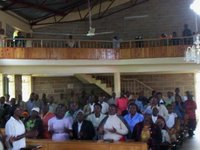

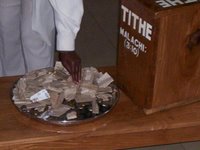
afterwards, as we were trying to leave, we were besieged by students wanting addresses and photos - it was endless. some were after our details in the hope we would send them money. one guy even gave me his bank account details!
when we finally got away, we all went back to the women's flat to have tea and cake that their next-door neighbour had baked. it was good just to sit around and laugh and talk with one another and eat yummy cake.
this morning we left st andrew's and headed out to our various churches to preach. paul and i went to st john's with rev simon. we got there just after 9am and joined the large sunday school class of about 60 children, to say hello and tell them something about ourselves. then we went into the service for a local boarding school where paul was asked to preach a short, impromptu sermon.
and then the main service started at about 1015hrs. this was the one i was due to preach at. the service was held in the kikuyu language as most people who come are of the dominant kikuyu tribe in the area. consequently, paul and i could not understand or join in much. but we did get the gist of what was going on for the most part. we did notice that there were some significant departures from the traditional english form of the anglican liturgy.
there was a thanksgiving offering that was given with much singing and dancing. the offering consisted of things like eggs, milk, sugar cane, chickens, fruit, and a cow. these were auctioned later in the service. the cow went for 6000ksh. at one point, there was a raffle being held, that would be drawn later that afternoon at a jumble sale.
the mothers' union were presentd with new robes that a parishioner had made for them. so they went outside, put them on, and processed back into the church amodst much singing and dancing.
the choir got up and led a bunch of songs. then the offering was taken. they have a system whereby everybody comes to the front and places their offering in a large plate as they sing joyfully. they also have a large box beside the plate for the tithe - the 10% offering from their income.
as this was going on, i remarked to rev simon that our way is to pass the plate around the pews. he said they used to do that but he changed it to the current system and their giving went up substantially. i think the way they do it is far more biblical, and is obviously more effective.
then i finally got up to preach at about 1230! rev simon accompanied me to the pulpit to act as my interpreter. i preached from john 5 - the healing of the man at the pool - and spoke about the power and grace of jesus that changes lives. essentially, i gave my testimony to them. it seemed to go down really well, and as justus was sitting in the congregation, i asked him later whether rev simon had interpreted me faithfully, and he said that he had.
i'd also made a throw-away comment about how i supposed some of the 400 odd people there had come because they were curious about the mzungu. justus said that was spot on, as many were there to hear for themselves what we were like after reading about us in the media. justus said that we had done really well, because by the end of the service people were very happy. we were happy too!
so the service finished about 1330hrs, and they didn't do communion because they knew we had to get away to get back to nairobi. after the service we had a quick lunch in the vestry before heading off to pick up the others.
we stopped into thika again on the way back, so that some could buy some more souvenirs. after dinner, we had a meeting for briefing about tomorrow, debriefing what the week was like, and tidying up a few bits and pieces. and now its time for bed. a very big day tomorrow with our overnight flight back to heathrow.
Thursday, October 19, 2006
green apples

thanks to jonny baker for pointing this out.
i was actually surprised at how badly apple performed in the green stakes. have a quick read through the site and send steve some pressure about cleaning up the apple. it'll only take a minute, and hopefully will help the little people at the other end of the disposal process live a little longer.
Tags: green my apple
relevance lost
good thought from the late, great thomas merton. makes you wonder about the church's gyrations to be relevant, eh...
“For me the ‘worldly’ attitude which I believe is nefarious is not simply the ‘turning to the world’ or even the total and would-be uncompromising secularism of the ‘honest to God’ set. Still less is it the noble concern for social justice and for the right use of technology to serve the real needs of modern man in his indigence and his despair. What I mean by ‘worldliness’ is the involvement in the massive and absurd mythology of technological culture and in all the contrived and obsessive gyrations of its empty mind. One of the symptoms of this is precisely the anguished concern to keep up with an ever-changing, complex, and fictitious orthodoxy in taste, in politics, in cult, in belief, in theology and what not, cultivation of the ability to redefine one's identity day by day in concert with the self-definition of society. ‘Worldliness’ in my mind is typified by this kind of servitude to care and to illusion, this agitation about thinking the right thoughts and wearing the right hats, this crude and shameful concern not with truth but only with vogue. To my mind, the concern of Christians to be in fashion lest they ‘lose the world’ is only another pitiable admission that they have lost it.”
Conjectures of a Guilty Bystander by Thomas Merton,
New York: Doubleday & Co, Inc., 1968 edition, p. 284
“For me the ‘worldly’ attitude which I believe is nefarious is not simply the ‘turning to the world’ or even the total and would-be uncompromising secularism of the ‘honest to God’ set. Still less is it the noble concern for social justice and for the right use of technology to serve the real needs of modern man in his indigence and his despair. What I mean by ‘worldliness’ is the involvement in the massive and absurd mythology of technological culture and in all the contrived and obsessive gyrations of its empty mind. One of the symptoms of this is precisely the anguished concern to keep up with an ever-changing, complex, and fictitious orthodoxy in taste, in politics, in cult, in belief, in theology and what not, cultivation of the ability to redefine one's identity day by day in concert with the self-definition of society. ‘Worldliness’ in my mind is typified by this kind of servitude to care and to illusion, this agitation about thinking the right thoughts and wearing the right hats, this crude and shameful concern not with truth but only with vogue. To my mind, the concern of Christians to be in fashion lest they ‘lose the world’ is only another pitiable admission that they have lost it.”
Conjectures of a Guilty Bystander by Thomas Merton,
New York: Doubleday & Co, Inc., 1968 edition, p. 284
Tags: merton, relevance, worldliness
Wednesday, October 18, 2006
new book

as part of my recuperative process, a friend from my theological college training days visited the other day, and gave me a present that i've just started reading. its by the musician and activist, billy bragg. the book is called, 'the progressive patriot - a search for belonging'. here's a bit from the inside cover:
reflecting on his family history and revisiting the music that inspired him, billy bragg pits his own values against those of traditional britishness in a search for a sense of belonging that is accessible to all. the progressive patriot is a book we all need to read. it pulls no punches in delivering its insights, and its radical vision offers positive hope to a nation no longer sure of its own identity.
i've just read the introduction so far, and am looking forward to reading the rest.
its on at a good price at amazon just now...
Tags: billy bragg, patriotism, britishness
Tuesday, October 17, 2006
the veil: a first-hand experience

yet another take on the issue of the veil that some muslim women wear. today in the guardian unlimited, a muslim journalist, zaiba malik, writes about her experiment in wearing the niqab. she has never worn it before, and is shocked by what she finds when she wears it for the first time.
Tags: muslim, veil, guardian unlimited, british
history matters - the biggest blog
author sebastian faulkes, and historian andrew roberts talk with caroline quinn on radio4's 'today programme' about a major project happening today that aims to get a picture of what happens in all manner of people's lives on this particular day.
check out the history matters website website here, and take a few moments to engage with something that will produce a broad social view of britain for future historians to grapple with, and maybe even, enjoy.
check out the history matters website website here, and take a few moments to engage with something that will produce a broad social view of britain for future historians to grapple with, and maybe even, enjoy.
Tags: history matters, radio4, biggest blog
hear no....see no....?
another interesting take on the issue of the muslim veil and jack straw in this article from ruth gledhill. i know she's not everyone's favourite journo (esp amongst anglican clergy), but she does have some insights that don't make the headlines amongst the standard papers.
Tags: jack straw, muslim veil
Sunday, October 15, 2006
beneath the veil

just been listening to a bbc radio4 documentary, unveiled, on the issue of the muslim veil in british society. this is a debate that has heated up over the past week, especially since the foreign sec, jack straw mp, wrote an article in his local paper and was subsequently interviewed on radio4's 'today' programme.
its a 30 min doco, and i was particularly interested in the last 7 mins, where the interviewer, Fareena Alam, editor of the Muslim magazine Q News, spoke with Navid Akhtar, an independent television producer whose work projects a positive image of Islam. he speaks about the existence of an already on-going debate within parts of the muslim community regarding this issue, and that that debate from within is what will cause a culture shift for the islamic community in britain, rather than any law passed by the govt proscribing islamic dress. he also speaks about the responsibility of the muslim community to take notice of where it is in its context - ie, a liberal western democracy, and that its ridiculous for the muslim community to pretend that it doesn't matter where it is, the 'where it is' will just have to put up with them. that individualistic idea is actually a liberal western idea that some modern muslims have taken for themselves, and is actually, un-islamic.
he goes on to talk about the responsibility the muslim community has to be proactive, good neighbours in the wider community. he says that muslims should primarily be practicers of kindness and neighbourliness - doers of good religion, not just lovers of the icons of religion (ie, veil, beard, etc).
this was a good documentary that asked pertinent questions. the interviewer was humble enough to begin with a mind open to be changed, and gave a good contribution to the national debate about 'what it means to be british'.
kenya 10a: 28 may




we're back in nairobi, in the a.c.k. guest house for our last night in kenya.
yesterday we spent the day with a parish priest, revd. simon, from st john's, kigomo. the idea was that we just be with one of the priests during their normal working day, and also to see the context and meet the local people, as we would be preaching in their church the next day.
revd simon is a very competent man, something of a trouble shooter, a strategist, an entreprenuer, a fundraiser, and a powerful leader. he has 3 churches in his parish, 2 of which we visited. during the course of the day, we met his executive of the parish council - and a good bunch they were too.
revd simon has turned the finances of the parish around, from being well behind in parish share by 300k kenyan shillings (ksh), to now paying their parish share of about 750k ksh in 10 months instead of 12 months. they also have a parish budget of about 530k ksh, which they meet each year for their own expenses. they have plans for erecting a new church, they're refurbishing the vicarage, and they employ staff.
i asked them the difficult question of 'what happens in 25 yrs time when western culture has gained a greater foothold, when the current leadership is no longer around, and when their single-purpose worship building has become a burden to maintain for the then congregation, as has been our expereience in england?'
they had thought of that. they actively engage with western culture, teach their young people about it, and have different ways of engaging their youth throughout the different phases of their development. the leaders also give a positive lead and provide a solid measure of control that provides firm boundaries. this kind of leadership seems to work well in kenyan culture, as its quite dominant from the top down, but also provide plenty of opportunity for others to use their gifts in all manner of ways, and indeed, expects people to be involved and develop any good ideas they have.
we went for lunch at a local cafe that was owned by one of revd simon's parishioners. then he took us for a walk down the high street of one of his churches, and introduced us to more of his parishioners who were traders in all manner of things.
we were always followed by a band of small kids who were amazed by us. revd simon said that this was the first time some of them had ever seen a 'mzungu' (white person) in their whole lives. they loved it when we took their photos and showed them on the camera.
at the end of the day, we went back to st andrew's for dinner. after dinner there were farewell speeches and singing for us. i simply can't describe the sensation of being amongst such genuinely warm and hospitable people whose grace flows from them in waves of blessing that brought tears to my eyes.
Thursday, October 12, 2006
kenya 9: 26 may



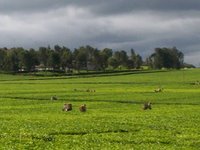
breakfast at 7am after a good sleep. then took off to the diocesan offices. got shown around the offices, and also the partly constructed church and partly constructed new diocesan offices. in their current state they looked dangerous as they're just a bunch of concrete girders and columns joined together. our health and safety exec would have a fit if they saw them, and just about have a heart attack if they realized people were able to climb around on them (as we did) and have church services in the partly constructed church.
our group split into 2: one group going off to visit various schools, and the other (ours) to see some functioning parts of the economy. our first stop was at an a.c.k. (anglican church of kenya) hospital. its only small, but well used by the community. to use the hospital, you must pay a fee, as it needs to be a sustainable enterprise - though not everyone can pay. those who can't pay are not turned away as the hospital's christian ethic is to treat all as of equal worth.
its got quite an holistic approach to life and death, as they grow much of their own food, have a cow for milk and meat production, and have their own morgue. patients get out and work in the garden, thus contributing the food they eat, but also it helps their recovery - emotionally as much as physically. this is in stark contrast to our uk system, where new hospitals ensue they have all the technology available for patients to access the internet, tv, and radio for their bed. but there is nothing invested in getting the patients to take an interest in things like food production, gardening, helping themselves. one of our group is a nurse in the uk, and she was amazed at how the kenyan attitude to rehab was far better for the whole human person than what we do in the uk.
then we went for lunch, which lasted nearly 2 hours. in kenya, you just have to understand that from the time you order your meal to the time it arrives take about an hour! it was a good time to talk with each other, including our guide for the day, revd benson, and our driver, justus. benson is the rural dean, and knows his deanery well. he spends about 60% of his time visiting families - this seems to be the backbone of effective evangelism in kenya. it's all about relationships.
following lunch, we visited a tea plantation - the kangaita - set on the slopes of mount kenya. it was interesting to see the pickers at work and learn something of the process. from the time the tea is picked until its processed and packed is 24 hours. an incredibly short time when you consider the complex process that the leaf goes through. and the pickers are very skilful. we bought half a kilo of tea each, though justus bought 2 kgs for his wife.
on the way back we visited a coffee co-op, but there nothing to see but the sheds as the season was ended.
Tags: kenya
Monday, October 09, 2006
kenya 8b: 25 may




after leaving isiolo, we made the long trek to meru, stopping at the izaak walton hotel for lunch. the national press were there waiting for us, so after lunch, we left (ignoring them) and made our way to kabare to stay at st andrew's theological college.
we arrived in time for arvo tea, and then attended the thursday evening communion service. we were a little apprehensive about what our welcome would be like following the press reports of the previous days. we needn't have worried though, as the principal, canon moses, made it clear in his sermon that we are all different culturally, and that we need to allow the law of love to cover our differences and be determined to preserve the unity of the bonds of peace in the body of christ. we were made to feel very welcome.
canon moses asked bishop john to say a few words afterwards, too. their communion services are fabulous and the words of their liturgy are meaningful and good - i think i'll use it in london sometimes.
after the service, we had a party! dinner was held in the midst of speeches from various people, as it was the last time they would do this before end of term. exams begin on monday, finish on friday, and everyone leaves on saturday. such a joyful, happy bunch of people i have never, ever met before, though they're reminiscent of maori people.
the whole night i was on the verge of tears - tears of joy and happiness at being accepted into such a beautiful body of people who are so willing to share anything they have with us.
please jesus, bless them with all your heavenly treasures, in your name i ask, amen.
Saturday, October 07, 2006
kenya 8a: 25 may




ascension day - wicked! so much to try to record. am feeling well, however, instead of diarrhoea, i'm now constipated....
after leaving samburu serena lodge, we went back to archer's post to pick up revd gabriel so that he could take us to a couple of villages on the way to isiolo, where we would spend the night. the first village was very close to archer's post, and was called the nachami wowen group. they herd goats, but also make money from tourists. so to visit the village costs 1000 shillings/person. they put on an official greeting ceremony, just like the one they did at the confirmation service on monday, then invited us into the village, where they did some more songs.
then the young man who was, or seemed to be, the head man for the day (his name was peter), showed us how to make fire using 2 sticks and dried donkey dung for tinder. when i asked him what the wood was, he said the bottom stick is from the root of the aguida tree, and the vertical stick is from the branch of the same tree. then he asked me if i wanted to buy them, so i bargained with him and settled on 600 shillings. i reckoned josiah would be pleased with them and be able to take them with him. i also bought a necklace for zoe.
they are a christian tribe, but they practice polygamy and male and female circumcision. this is part of their culture, and not something they will give up. when we spoke to revd gabriel about it, he said there are some things you've just got to accept as cultural and work around them. makes for some interesting reflections around cultural issues, particularly in the light of the gay rights issue we're faced with here.
after leaving the nachami, we visited the turkana people, who are nomads, and also christians. they are completely different from the people of the samburu district. revd gabriel is half turkana and half samburu. from there we moved on to isiolo, where we were to spend the night. on the way, one of our tyres blew out as a sharp stone ripped it apart. when we got to isiolo ccs (christian community services), we had lunch and got into our rooms.
after a short break, we went out to visit some schools: the school for deaf children, the school for partially and completely blind children, and a community hostel for abandoned children. all were fabulous and gave us a warm welcome.
the ccs station is set up as a multi-disciplinary environment. it has an agri-vet dispensary for animal welfare, a small clinic for people, a laboratory, a computer suite for training, a warehouse for storing maize, and a model farm for experimenting with new dry-land farming techniques. the farming is very difficult as it relies on rain, and up until a couple of months ago, it hadn't rained a drop for 3 years! then they had some heavy rains, but after a couple of weeks of heat and wind, the moisture had evaporated.
its a very harsh environment!
Tags: kenya, isiolo, archer's post, nachami, turkana
Wednesday, October 04, 2006
kenya 7b: 23 may
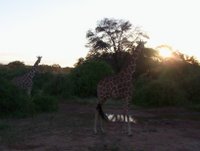



then we left to come here to samburu. after checking in, we went for a drive through the game park and saw all manner of wildlife including elephants, giraffe, oryx, antelope, dicdic, birds, sqirrels, baboons, monkeys - fabulous to see them in their natural environement. when we went back as darkness fell, we went to an area where crocodiles come up to the fence to eat meat thrown to them by the hotel. we could see a big croc out in the river, but he didn't come in.
this morning we went out again for a game drive at 0630, and saw all the creatures already mentioned again, plus a lioness. she was very hungry, hollow belly, and was just sitting there. after a while, she got up and began to stalk a herd of antelope about 400 yards away. just now, i can see a croc swimming upriver - wish i had some binoculars...
on our way to breakfast, we drove down to the riverbank where a big bull elephant was drinking on the other side of the river. beside him was a green croc basking in the sun. after a couple of minutes, the elephant started crossing the river toward us, and as he got closer our guide drove us away as the elephant was not happy about us being there. our guide, justus, told us that they will warn us twice, and will charge on the third time.
came back for breakfast, and then went on a guided nature walk around the compound. a young woman guided us and showed us plants and birds - she was very knowledgable. this lodge is overwhelmingly different to the simple, poor people we've seen mostly in kenya. there's an enormous gap between rich and poor in this country.
there is a great deal to think about, but strangely (perhaps) i'm not feeling overwhelmed by it; i'm just letting it wash over me. i wonder if there will be some kind of delayed reaction....
and bishop john has just made the front page of the national newspaper, the nation. i haven't seen the article, but apparently the archbishop of kenya has withdrawn his invitation to us in kenya...
Subscribe to:
Posts (Atom)







